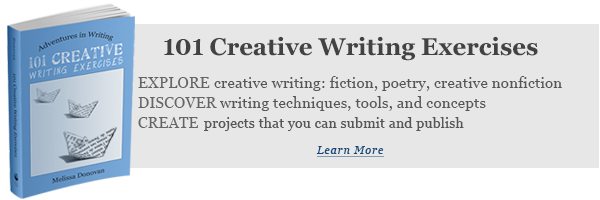
From 101 Creative Writing Exercises: Rock and Rhyme Poetry.
Today’s post features an exercise from my book, 101 Creative Writing Exercises (aff link), which is filled with exercises for various forms of writing, including fiction, poetry, and creative nonfiction. It will inspire you while imparting useful writing techniques that are fun and practical.
This exercise comes from “Chapter 8: Free Verse.” The creative writing exercises in this chapter focus on free-form poetry writing.
I chose this exercise because it’s playful and inspiring. It asks you to use a song as a foundation for writing a poem. Many song lyrics are poems in their own right. This exercise focuses on rhyming, but it also shows you how to look at your writing’s musicality and encourages you to think about rhythm and meter in your work.
Rock and Rhyme Poetry Writing Exercise
Rhyming poetry goes in and out of vogue all the time, except when it comes to children’s poetry, which is almost always packed with fun and clever rhymes.
Some poets take to rhyming rather easily, and sound-alike words roll off their tongues like butter. Other poets struggle, dancing through the alphabet and flipping through rhyming dictionaries just to find a rhyme as simple as bat and cat.
Poems that rhyme may be a challenge for some, but they’re still fun to write and a blast to read (they are especially fun to read out loud). Rhyming is good practice for exploring musicality in language and experimenting with word play.
The Exercise
All you need is a song — a rhythmic and rhyme-y song without a lot of fancy runs. You’ll want a relatively simple tune. A short pop song will work well. Forget about classical music because most of it doesn’t have lyrics, and what we’re doing requires words. We’re writers, right?
Rewrite the lyrics but keep the rhythm and rhyme scheme intact. You don’t have to replace the rhyme ring and sing with a rhyme like thing and bling. But you do need to find another rhyming pair (like dance and pants). Your rhymes can be as strict or as loose as you want.
If you do just a few of these, rhyming will start to come more naturally to you, and your rhymes will flow with greater ease.
Try to rewrite the song on your own, but if you’re really struggling, hit up a rhyming dictionary or a thesaurus.
Tips: You might want to start with a short, three-chord pop song. Then, graduate yourself to longer and more complex tunes. If you know all the lyrics to your song, that will be immensely helpful. If not, do an online search to find the lyrics to the song you want to work with.
Variations: Here are a few variations that you can use for this exercise:
- Try it with nursery rhymes: Hey diddle diddle.
- Try it with a famous poem: Shakespeare anyone?
- Try it using a song without lyrics: You’re on your own!
Applications: Working with rhyme helps you think more carefully about word choice and points your focus to the sound and rhythm of a piece of writing. This is also an excellent exercise for anyone who has thought about writing song lyrics or children’s poems and stories.
I Rocked Some Poetry
Here’s my attempt with the first chorus from 80s one-hit wonder “99 Red Balloons” by Nena.
The Original Verse
You and I in a little toy shop
Buy a bag of balloons with the money we’ve got
Set them free at the break of dawn
Till one by one they were gone
Back at base, bugs in the software
Flash the message: something’s out there
Floating in the summer sky
Ninety-nine red balloons go by
My Attempt to Catch the Rhyme
Shoes untied at a little bus stop
Sigh and whistle a tune ’cause it’s all you’ve got
Set your feet on the tired green lawn
Tie your shoe, stretch and yawn
Five o’clock, the bus should be here
Time is precious, the deadline is near
Waiting till the bus comes by
Ninety-nine cents just for a ride
Are You Ready to Get Down?
Try it for yourself and post a verse or a chorus in the comments! If you’re looking for a song lyric resource, then check out 99 Red Balloons and 100 Other All-Time Great One-Hit Wonders (aff link), which is packed with awesome song lyrics that are ideal for this exercise.





Original: So Lonesome I Could Cry by Hank Williams
My version: We Said Our Last Goodbye
http://joycefied.wordpress.com/2010/04/11/we-said-our-last-good-bye-a-rock-and-rhyme-poem/
Standing on a lonely hill
Beneath a cloudy sky
He always thought our love would grow
Before we said our last good bye.
.
Didn’t know just what he did wrong
Never got to ask me why
Why must I be so doggone proud
To make us say good bye
.
Will I ever get a full night’s sleep
When clouds roll through the sky
For I never learned how to forgive
When we said our last good bye.
.
I always wonder from afar
Let out a mournful sigh
As I wish upon a star
After we said our last good bye.
This is excellent! You’ve done a great job using imagery and storytelling in recreating the lyrics to this classic tune. Nice work!
I love this concept. I’m a habitual rhymer and often there’s a tune playing in my head when I write something down.
So I’ll give it a whirl with Paul McCartney [I Want to Hold Your Hand].
============================================
MY SILLY VERSION
Oh say, can you see me
I’m waving both my hands
Descend the plane so gently
Here is the place to land
Here is the place to land
Here is the place to land
I hope you see my signal
Alone upon the sand
And please do not kill me
As you attempt to land
Here is the place to land
Right here upon the sand
And when I spot you I get nervous and cry
It’s such a worry
Oh my nerves
I might die
I might die
I might die
Thank God you saw my signal
As you approached the sand
Thankfully you did not crush me
In your attempt to land
You found the place to land
Right here upon the sand
As I read this, I kept thinking about some person on an island with a plane flying overhead and trying to land. Interesting concept. You did a good job staying in tune with the rhythm of the Beatles song!
I am expecting my first great granddaughter who is the inspiration for my poem from the original that I used:
MY COUNTRY ‘TIS OF THEE
My great granddaughter to be
Sweet precious jewell to me
What joy you’ll bring.
I plan when you arrive
I plan to be your guide
From Morn to Eventide
Your welcome clings.
Great job, Barbara!